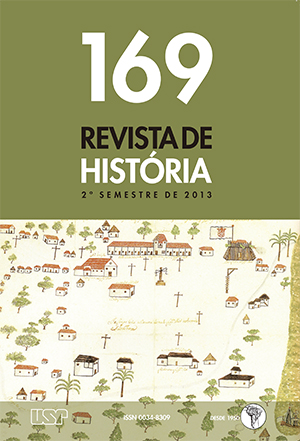"In brazilian costumes": justice and constitution in the ibero-america (C. 1750-1850)
DOI:
https://doi.org/10.11606/issn.2316-9141.v0i169p181-221Keywords:
justice, constitution, tradition, institutions, Ibero-AmericaAbstract
Standing at the intersection between constitutionalism and independence, the article aims to discuss the institutional dynamics of justice in the framing of the Empire of Brazil as part of a shared legal tradition throughout the Ibero-American world, focusing on the cycle of changes occurred between the mid-eighteenth and nineteenth centuries. For that, the enfasis is in the guarantees of justice, which, once embedded in the culture of ius commune, would be central to the new states in America through the statization of elements that ensured the operation of an old key: that the “good administration of justice” relied on “the good judge”, and his straight behavior, not on the laws and their proper application. From the prevalence of a “justice of judges”, the conclusion is that, without codes in the modern sense, it was impossible to implement a “legal justice” regimen.
Downloads
Downloads
Published
Issue
Section
License
Copyright (c) 2013 Revista de História

This work is licensed under a Creative Commons Attribution-NonCommercial 4.0 International License.
Autores que publicam nesta revista concordam com os seguintes termos:
- Autores mantém os direitos autorais e concedem à revista o direito de primeira publicação, com o trabalho simultaneamente licenciado sob a https://creativecommons.org/licenses/by/4.0/ (CC BY). Esta licença permite que outros distribuam, remixem, adaptem e criem a partir do seu trabalho, mesmo para fins comerciais, desde que lhe atribuam o devido crédito pela criação original. É a licença mais flexível de todas as licenças disponíveis. É recomendada para maximizar a disseminação e uso dos materiais licenciados.
- Autores têm autorização para assumir contratos adicionais separadamente, para distribuição não-exclusiva da versão do trabalho publicada nesta revista (ex.: publicar em repositório institucional ou como capítulo de livro), com reconhecimento de autoria e publicação inicial nesta revista.
- Autores têm permissão e são estimulados a publicar e distribuir seu trabalho online (ex.: em repositórios institucionais ou na sua página pessoal) a qualquer ponto antes ou durante o processo editorial, já que isso pode gerar alterações produtivas, bem como aumentar o impacto e a citação do trabalho publicado (veja O Efeito do Acesso Livre).







